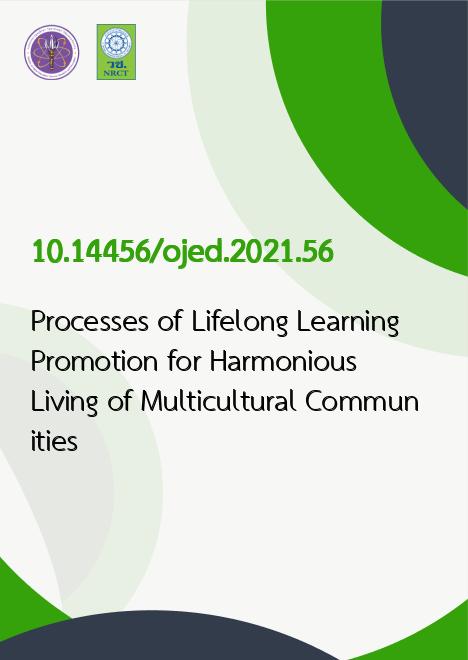
|
Processes of Lifelong Learning Promotion for Harmonious Living of Multicultural Communities |
|---|---|
| รหัสดีโอไอ | |
| Creator | Siva Boonsin |
| Title | Processes of Lifelong Learning Promotion for Harmonious Living of Multicultural Communities |
| Contributor | Manaswas Kovitaya |
| Publisher | Centre for Education Innovation, Print and Online Media |
| Publication Year | 2564 |
| Journal Title | An Online Journal of Education |
| Journal Vol. | 16 |
| Journal No. | 2 |
| Page no. | OJED1602040 (15 pages) |
| Keyword | lifelong learning, harmonious living, multicultural communities |
| URL Website | https://so01.tci-thaijo.org/index.php/OJED |
| Website title | An Online Journal of Education |
| ISSN | ISSN 1905-4491 (Online) |
| Abstract | The purposes of this research were to: 1) study the opinions of people living in model harmonious communities about living harmoniously and 2) propose recommendations about processes of lifelong learning promotion for harmonious living of multicultural communities from opinions of people living in the model harmonious communities. The sample groups of this research were 3 model harmonious communities in Bangkok Metropolitan Area by using simple random sampling totally 400 respondents. The research instruments were questionnaire, observation form and in-depth interview schedule. The research findings were: 1. The opinions of people living in model harmonious communities about living harmoniously found that 1) the living harmoniously were at high level (M = 3.87, SD = 0.66) which friendliness is the highest, 2) the processes of lifelong learning promotion for harmonious living of multicultural communities were at high level (M = 3.86, SD = 0.69) which informal education is the highest, and 2. The recommendations about processes of lifelong learning promotion for harmonious living of multicultural communities consist of 1) processes of formal education promotion such as enrollment of children within school’s area, 2) processes of non-formal education promotion such as professional training for unemployed people, and 3) processes of informal education promotion such as grouping to learn activities by common interests. |